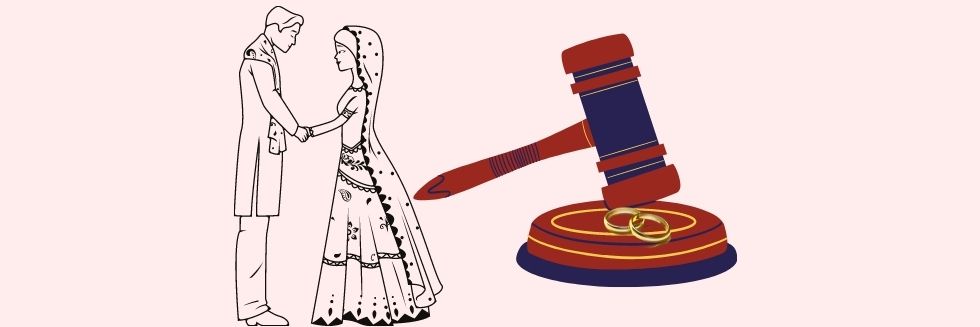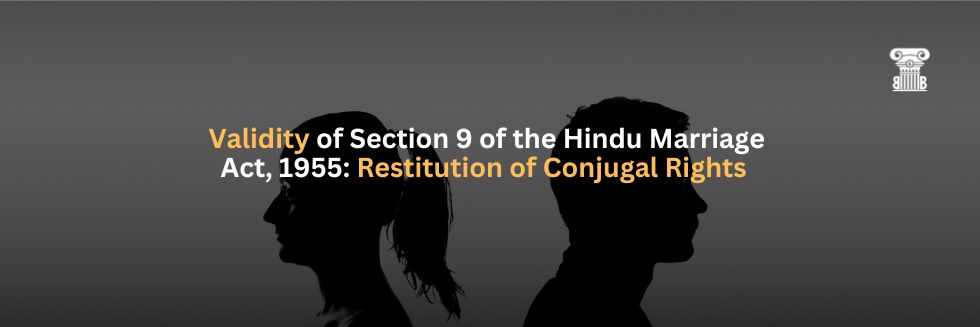In our traditional society, marriage is more than just a union of two people; it is also the merger of two families. There is an expectation that spouses in such a marriage would adhere to the valued traditions, goals, and ideals because of the family. Within society, there are interconnected structures. Every society in the world has its own view about family and marriage. However, all such cultures have one thing in common: a widely held belief that the individuals’ relationship is for camaraderie, mutual respect, and joy. So, the question arises, can there exist un-consensual sexual intercourse between a husband and wife? Let us first understand what marital rape is under Indian law or marital rape laws in India.
What Is Rape Under Indian Law?
Section 375 of the IPC talks about rape and what actions, if committed by a man, might subject him to punishment under Section 376 of the IPC. The goal of Section 375 of the IPC may be understood by Justice Krishna Iyer’s statements in the case of Rafiq v. State of UP, where he stated that a murderer destroys the body of a victim, while a rapist kills the spirit. As a result, rape is seen as a more heinous violation against humanity than murder.
A man is said to commit “rape” who has sexual intercourse with a woman under circumstances falling under any of the six following descriptions.
i. Against her will.
ii. Without her consent.
iii. With her consent, when her consent has been obtained by putting her or any person in whom she is interested in fear of death or of hurt.
iv. With her consent, when the man knows that he is not her husband, and that her consent is given because she believes that he is another man to whom she is or believes herself to be lawfully married.
v. With her consent, when, at the time of giving such consent, by reason of unsoundness of mind or intoxication or the administration by him personally or through another of any stupefying or unwholesome substance, she is unable to understand the nature and consequences of that to which she gives consent.
vi. With or without her consent, when she is under sixteen years of age.
What Is Consent?
Before we delve any further, let us also understand what consent means. Section 90 of the IPC states that “a consent is not such a consent as it intended by any section of this Code, if the consent is given by a person under fear of injury, or under a misconception of fact, and if the person doing the act knows, or has reason to believe, that the consent was given in consequence of such fear or misconception; or Consent of an insane person.—if the consent is given by a person who, from unsoundness of mind, or intoxication, is unable to understand the nature and consequence of that to which he gives his consent; or Consent of child.—unless the contrary appears from the context, if the consent is given by a person who is under twelve years of age.”
Section 90 of the IPC does not define what constitutes “consent” but does specify what not consent is.
Legal Provisions And Marital Rape Statistics In India
Rape is not just a kind of cruelty against women, but it is also a serious violation of a person’s fundamental right to life with dignity and individual freedom. The connection between the victim and the perpetrator does not change the situation. In this sense, it is not correct to believe that sex with spouse is a privilege granted to the husband by marriage. Social dishonour is related to marital rape because it silences a woman’s voice against her husband, who takes advantage of his superior position to shatter her trust and individual reliance. Marital rape has been shown to be more traumatic, with long-term physical and emotional consequences.
Injuries to private organs, miscarriages, stillbirths, bladder infections, infertility, and the possible transmission of sexually transmitted illnesses such as HIV/AIDS are among the physical consequences. Women who have been raped by their spouses might experience serious psychological consequences such as flashbacks, sexual dysfunction, and mental suffering for years after the incident.
Sexual intimacy is an essential component of marriage because it is the spiritual and biological union that allows the marital goal of conception to be realised. It implies reciprocal love and self-giving, and as such, it solely considers consensual sexual participation rather than sexual compulsion or imposition.
In English law, a husband and wife were regarded to be one person. Sir Mathew Hale remarked in 1736, “the husband cannot be guilty of a rape committed by himself upon his lawful wife, for by their mutual matrimonial consent and contract the wife hath given herself up in this kind unto her husband which she cannot retract.”
Also, in 1803, East declared: “… a husband cannot by law be guilty by ravishing his wife, on account of the matrimonial consent which she cannot retract.”
As per Section 375 of IPC, un-consensual intercourse with one’s wife would also amount to rape. However, it is not the case as Section 375 comes with an exception which is that sexual intercourse by a man with his own wife, the wife not being under fifteen years of age, is not rape.
Furthermore, Section 376A of IPC, states that intercourse by a man with his wife during separation.—Whoever has sexual intercourse with his own wife, who is living separately from him under a decree of separation or under any custom or usage without her consent shall be punished with imprisonment of either description for a term which may extend to two years and shall also be liable to fine.
As a result, marital rape is only considered rape if the spouse is under the age of 15, and the punishment is less severe. After the age of 15, there is no legal security agreed to for the spouse, which violates human rights guidelines. A similar rule, which makes the legal age of consent for marriage 18 years old, protects only individuals under the age of 15 from sexual mistreatment by the spouse.
If a husband has sexual intercourse or engages in any other sexual actions with his own wife who is under the age of 18, this is considered rape. The conduct complained about or claimed in a case like this would undoubtedly amount to rape under Section 375 of the IPC. The idea of marital rape is not recognised under Section 375. If the complainant is the accused’s lawfully wedded wife, sexual intercourse with her or other sexual acts committed by the accused would not constitute a rape offence, even if done by force, violence, or against her will.
When it comes to the marital rape statistics in India, very few cases are reported but sufferers can be many. So, there is a lot of ambiguity regarding marital rape stats. But there are resources available where you can hear marital rape victim stories.
Protection Available To Women Against Marital Rape In India
The Central Government established the Justice Verma Committee on December 23, 2012, in response to the rape of a 23-year-old student. Justice J.S. Verma (Former Chief Justice of India), Justice Leila Seth (Former Judge High Court of Delhi), and Mr. Gopal Subramanium were on the committee. The committee was invited to investigate potential changes to criminal legislation relating to sexual assault against women. The committee was aware of the recommendations made by the United Nations Committee on the Elimination of Discrimination Against Women (CEDAW Committee) in February 2007 regarding India.
The CEDAW Committee suggested that the nation “widen the definition of rape in its Penal Code to reflect the realities of sexual abuse experienced by women and to remove the exception of marital rape from the definition of rape…”. According to the Verma Committee report, 18.8 percent of women had been raped by their spouses on one or more occasions. The incidence of reporting remains low, which is exacerbated by widespread ideas that marital rape is acceptable or less serious than other forms of rape. The recommendation of Justice Verma Committee regarding deleting the exception of marital rape was not included in the Criminal Law Amendment Bill, 2013 passed by the Lok Sabha on 19th March 2013 and by the Rajya Sabha on 21st March, 2013.
Given the current state of the law in our nation, a woman cannot commence criminal proceedings against her lawfully wedded husband for rape offence punishable under Section 376 of the IPC. One of the foundations of the concept of a marital exemption from rape laws (the rule that a husband cannot be prosecuted with raping his wife) is the belief that through marriage, a woman gives her husband irreversible agreement to have sex with her whenever he desires. However, there are a few legislations which can be used by a woman in an event of marital rape.
1. Section 377 of IPC:
The word “unnatural offence” appears in Chapter XVI of the Indian Penal Code, which deals with offences against the human body, and is the last offence in that chapter. The term ‘unnatural crimes’ appears in the title of the offence. The term “unnatural” refers to something that is opposite to nature; aberrant; and not spontaneous. The term ‘carnal’ connotes something related to the body, particularly sexual demands and actions. In this context, an unnatural crime refers to sexual actions that are opposed to nature. The Indian Penal Code 1860 defines it as “carnal intercourse with any man, woman, or animal against the order of nature.”
Section 377 of the Indian Penal Code 1860 makes it an offence by declaring that “whoever has carnal Intercourse against the order of nature with any man, woman or animal shall be punished with imprisonment for life, or with imprisonment of either description for a term which may extend to ten years, and shall also be liable to fine.” The Section further makes it clear that penetration would be sufficient to constitute the carnal intercourse necessary to the offence described in the section.
The Buggery Act of 1533 inspired Section 377 of the Indian Penal Code. It is worth noting that this statute has not been modified by Parliament since its inception. This law is founded on Judeo-Christian moral and ethical principles that view sex as merely functional, that is, for procreation, and on this premise homosexuality is considered unnatural and against the natural order.
In India, the term “carnal intercourse against the order of nature” has been defined so widely that it now covers anything from oral and anal sex to penetration into artificial orifices such as folded palms or between thighs. Such a broad application of Provision 377, where the text itself is not very clear, has resulted in arbitrary implementation of the legislation, raising concerns about the constitutional legitimacy of this Section.
It is imperative to delve into the ingredients of this Section to understand what the criteria for the constitution of the offence are. The same are set out below:
i. Voluntarily
ii. Carnal penetration
iii. Against the order of nature.
The word “voluntary” makes it clear that engaging in any of the carnal activities contemplated by this Section would inevitably be penalised as an unnatural offence, regardless of the wife’s permission.
The interpretation of Section 377 contradicts the framework of the IPC, accepted norms of interpretation, and the evolving character of society. Section 377 punishes anybody who willingly engages in carnal intercourse against the natural order. This would entail punishment for:
a. anybody who has intercourse with his wife other than penile-vaginal intercourse; and
b. anyone who has intercourse with a woman without taking a contraceptive.
Section 377’s phraseology (‘Carnal intercourse against the order of nature’) is old and archaic. Section 377 should be viewed in the context of its inclusion in the IPC as criminalizing an act that has an ill effect on the human body, rather than an act that is an offence against morality, as dealt with in Chapter XIV. Clause 377’s phrase is qua damage of adverse affection to the body, which is the context in which the section arises. It would have to be linked to a sexual assault.
Thus, it’s quite obvious that Section 377 IPC specifies specific behaviours that, if done, would constitute a crime. The Supreme Court has held that consent is not the determining criterion in the case of unnatural offences and that any offence against the order of nature and can be described as carnal penetration would constitute an offence under Section 377 of the IPC, implying that a wife can initiate proceedings against the husband under Section 377 for unnatural sex.
Thus, if the husband is accused of forcing his wife to have oral sex and then engages in it, he commits an offence under Section 377 of the IPC. To put it another way, in light of the Supreme Court’s ruling, Section 377 IPC would apply in the instance of heterosexual couples when the husband had coerced the wife into carnal penetration of the orifice of the mouth. In fact, even cases when the wife has consented to such an act will fall firmly within this rule, as consent is not the determining element in determining the nature of the violation.
2. Protection of Women from Domestic Violence Act, 2005
The objective of the Act lays down “An Act to provide for more effective protection of the rights of women guaranteed under the Constitution who are victims of violence of any kind occurring within the family and for matters connected therewith or incidental thereto.”
In one of the first cases since the enactment of the DV Act, the Madras High Court observed in Vandhana v. T. Srikanth, 2007 SCC Online Mad 553, that the Act was drafted to implement Recommendation No. 12 of the United Nations Committee on the Elimination of All Forms of Discrimination Against Women (CEDAW), 1989, which India ratified in June, 1993. The interpretation of the DV Act shall be consistent with international treaties, protocols, and standards. In the case of Ishpal Singh Kahai v. Ramanjeet Kahai, 2011 SCC Online Bom 412, the Bombay High Court emphasized that the purpose of the DV Act is to provide statutory protection to victims of domestic abuse.
Domestic violence under the Act has been defined to include any act, omission or commission or conduct of the respondent shall constitute domestic violence in case it:
i. harms or injures or endangers the health, safety, life, limp or well-being, whether mental or physical, of the aggrieved person or tends to do so and includes causing physical abuse, sexual abuse, verbal and emotional abuse and economic abuse; or
ii. harasses, harms, injures or endangers the aggrieved person with a view to coerce her or any other person related to her to meet any unlawful demand for any dowry or other property or valuable security; or
iii. has the effect of threatening the aggrieved person or any person related to her by any conduct or otherwise injures or causes harm, whether physical or mental, to the aggrieved person.
While the DV Act does not specifically use the word marital rape, the Act does include sexual abuse of any kind as a cause of action. What exactly constitutes sexual abuse under the Act has been defined to include any conduct of a sexual nature that abuses, humiliates, degrades or otherwise violates the dignity of a woman.
The Protection of Women from Domestic Abuse Act of 2005 was passed in 2005, and while it did not deem marital rape a crime, it did consider it a type of domestic violence. If a woman has been subjected to marital rape, she can seek judicial separation from her husband under this Act. This is simply a patchwork of legislation, and the Parliament has to do much more to address marital rape.
3. Section 354, IPC:
Section 354, IPC, states that whoever assaults or uses criminal force to any woman, intending to outrage or knowing it to be likely that he will thereby outrage her modesty, shall be punished with imprisonment of either description for a term which may extend to two years, or with fine, or with both.
Section 354 refers to “any woman,” implying that a person may be held guilty of outraging the modesty of any woman, even his wife. If the husband expresses his affection towards his wife in public in an unkind manner such conduct will:
a. amount to an indecent behaviour;
b. be against ‘public morality’; and
c. amount to an outrage under section 354.
Such personal acts done by the husband as are not acceptable to the wife even in private and also not approved by society, should also fall under the scope of Section 354. Today no woman or society would approve of perverted sexual acts as being a legitimate part of the spousal relation.
It is possible that if the spouse attacks or uses illegal force against her, the act will be considered an outrage under Section 354, regardless of whether it was done with or without her agreement or in the absence of a third party. Under the present system, the question of the husband’s awareness, intention, or developed sensibility becomes immaterial, and the husband’s deliberate outrageous behaviour is untenable. As a result, it appears that a husband may be found guilty of an offence under Section 354 even if the victim is his wife.
4. Section 498A of IPC:
Prior to the enactment of the Protection of Women from Domestic Violence Act, 2005 (“DV Act”), the victim could approach the court under Section 498-A of the Penal Code, 1860, which provides for ‘husband or relative of husband of a woman subjecting her to cruelty,’ with only a specific set of offences dealing with cruelty to married women being the only recourse. All other instances of domestic violence inside the home had to be handled under the IPC crimes that the different acts of violence represented, regardless of the victim’s gender.
The perverted sexual practices alleged by a wife which she herself did not approve would definitely amount to mental as well as physical cruelty.
If one spouse desires healthy and normal sexual relations and the other desires perverted sexual relations, such as cunnilingus and fellatio, then the normal sexual relationship between the spouses, which forms the foundation of a happy marital life, would be floundered on the bed-rocks of sexual aversion on the part of the spouse who is normal and not deviant, and the insistence of the other spouse who is deviant, would tantamount to mental as well as physical cruelty.
5. Hindu Marriage Act, 1955:
A partner in a marriage has a choice, which is important to the autonomy given by natural law and the Constitution. The enumerated reasons for divorce, such as cruelty, adultery, desertion, and so on, to award divorce include a hint of heteronomy.
Under Section 13 of the HMA, 1955, cruelty has been described as one of the grounds of divorce. In Maya Devi v. Jagdish Prasad, AIR 2007 SC 1426, it was stated that cruelty which is a ground for dissolution of marriage may be defined as wilful and unjustifiable conduct of such character as to cause danger to life, limb or health, bodily or mental, or as to give rise to a reasonable apprehension of such a danger. Cruelty need not be physical.
In Neelu Kohli v. Naveen Kohli, AIR 2004 All 1, it was held that “the expression cruelty as envisaged under Section 13 of the Act clearly admits in its ambit and scope such acts which may even cause mental agony to aggrieved parties. Intention to be cruel is not an essential element of cruelty as envisaged under section 13 (1) (ia) of the Act. It is sufficient that if the cruelty is of such type that it becomes impossible for spouses to live together”
The term cruelty can be interpreted to include sexual cruelty as marital rape causes immense mental agony to the victim.
Differing Opinions And Judgements Related To Marital Rape in India
i. In the case of, Nimeshbhai Bharatbhai Desai vs State Of Gujarat, the Hon’ble Gujarat High Court stated that:
The following three kinds of marital rape, are generally prevalent in society:
a. Battering rape: Women in this sort of marital rape are subjected to physical and sexual abuse in the relationship in a variety of ways. Some cases involve the wife being pummelling during the sexual violence, or the rape occurring after a physical violent event in which the husband attempts to make amends and coerces his wife to have sex against her will. In the majority of incidents, the victims fell into this group.
b. Force only rape: In this sort of marital rape, husbands use as much force as is required to force their wives. Battering may not be a characteristic in such circumstances, and women who decline sexual intercourse are frequently subjected to such assaults.
c. Obsessive rape: Assaults in obsessive rape typically entail cruel torture and/or strange sexual practises and are violent in nature. Sadistic rape is another term for this form of rape.
The Court further stated that a woman is no longer classified as a chattel and a husband who engages in sexual relations with his wife is not only exploiting a property; he is fulfilling a marital partnership with a fellow human being of equal dignity to that which he affords himself. He must not be allowed to harm her dignity by forcing her to do a sexual act without her complete and free permission.
Furthermore, a husband who is dissatisfied with his apathetic or uninterested wife’s categorical refusal to participate in sexual contact may lawfully seek the court’s involvement to declare her psychologically incapable of fulfilling a fundamental marital commitment. He cannot and should not, however, coerce or forcibly demand sexual intercourse from her.
The equal protection provision is violated when marital rape cases are treated differently than non-marital rape cases. The constitutional right to equal protection of the laws states that similar subjects should not be treated differently in order to give undue favour to some while unfairly discriminating against others; no person or class of persons shall be denied the same legal protection as other persons or classes in similar circumstances. Women’s human rights include the right to regulate and make free and responsible decisions about their sexuality, including sexual and reproductive health, free of coercion, discrimination, and abuse. Women do not relinquish such rights by marrying for the obvious reason that human rights are inalienable.
Husbands must be reminded that marriage does not provide them permission to rape their wives. Marriage does not give a husband ownership of his wife’s body. She does not lose her human right to exclusive autonomy over her own body by marrying, and she can thus legitimately choose to grant or withhold her permission to marital coitus. A spouse who is enraged by his wife’s unwavering reluctance to participate in sexual intercourse cannot use criminal force or coercion to compel her to submit.
ii. The Hon’ble Chhattisgarh High Court in Dilip Pandey vs State Of Chhattisgarh on 23 August 2021, held that “exception II of Section 375 of the I.P.C. referred to above, makes it clear that sexual intercourse or sexual act by a man with his own wife, the wife not being under eighteen years of age, is not rape. In this case, the complainant is legally weeded wife of applicant No. 1, therefore, sexual intercourse or any sexual act with her by the applicant No. 1/husband would not constitute an offence of rape, even if it was by force or against her wish. Therefore, the charge under Section 376 of the I.P.C. framed against the applicant No. 1/husband is erroneous and illegal. Hence, he is entitled to be discharged from the charge under Section 376 of the I.P.C.”
iii. The Hon’ble High Court of Kerala in the case of X versus X, Mat. Appeal No. 151 of 2015, on 30-07-2021, stated that:
According to the Bench, a husband’s licentious disposition neglecting the autonomy of the wife is a marital rape, and while such behaviour cannot be penalised, it fits under the framework of bodily and emotional cruelty. Though foreign to Indian criminal law, Black’s Law Dictionary 8th Edition classified marital rape as “a husband’s sexual intercourse with his wife by force or without her permission.” As a result, marital rape happens when a husband believes that his wife’s body owes him. In current social jurisprudence, couples in marriage are recognised as equal partners, and the husband has no greater right over the woman, either in terms of her body or of her personal identity. Treating a wife’s body as something owed to her husband and engaging in sexual acts against her consent is marital rape.
Bodily integrity is included in the right to respect for physical and mental integrity; any disrespect or violation of bodily integrity is a breach of individual autonomy. As a result, marital privacy is inextricably linked to individual liberty, and any encroachment, physical or otherwise, into such space would erode privacy. This would essentially be cruelty. As a result, just because the legislation does not recognise marital rape as a form of cruelty in order to give divorce does not preclude the court from considering it as a form of cruelty in order to grant a divorce. As a result, the Bench determined that marital rape is a valid reason for divorce.
This article is written by Anjali Bisht. The author can be contacted via email at anjali@bnblegal.com.






